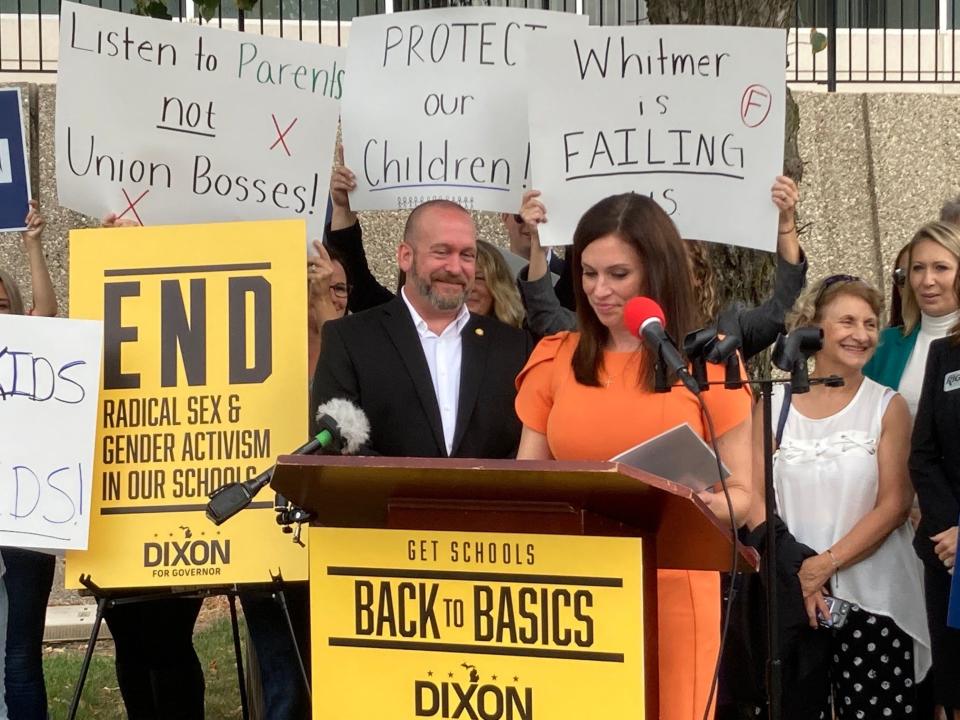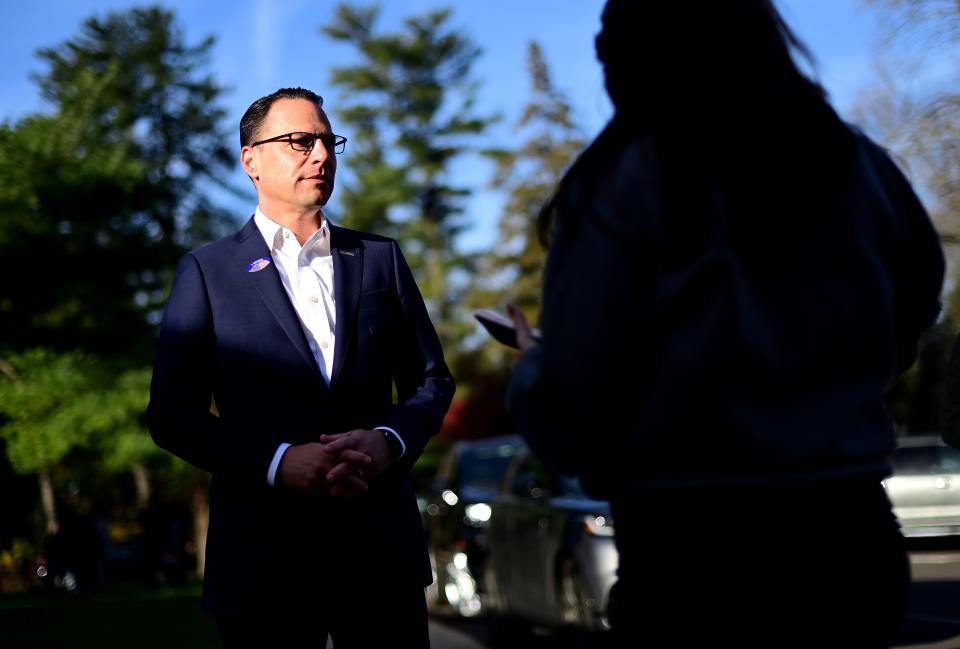Did Republicans take over school boards? Key education takeaways from the 2022 midterms
In this year’s midterms, the GOP in part banked on the idea that voters – in particular, parents – were fed up with the educational status quo. That these voters wanted more of a say over their kids’ learning, and less emphasis on lessons about racism and gender identity. Conservatives waving the banner of parents’ rights ran for hundreds of school board seats as well as state-level positions, from superintendent to governor.
These candidates secured victories in a few key races, but in many battleground states they lost more often than they won. And while education issues may have waned in importance for voters in the months leading up to the election, where they did influence ballot decisions it was often in Democrats’ favor.
“Republicans’ extreme position on education hurt them,” said Jennifer Berkshire, an author and podcaster who writes about and studies education politics. “There’s a mismatch between what these (right-wing) candidates are selling and what voters are signaling they care about.”
The GOP tightened its grip on education: Parents' rights activists say Democrats are to blame
School board elections: ‘A mixed bag’
Ballotpedia has been tracking the results of school board races involving fights over culture war issues such as critical race theory, a graduate-level framework examining how systemic racism continues to permeate society, and COVID-related policies. The organization is still going through the results of so-called conflict school board races, and as of Thursday had analyzed roughly 70% – 1,263 – of the 1,800 conflict seats up for election.
Among those 1,263 seats, the victors are fairly evenly split between those who expressed support for inclusive curricula, diversity policies or COVID mandates (32%) and those who expressed opposition (31%). Another 36% of the victors in those 1,263 seats couldn’t be categorized.
“It really does feel like a mixed bag,” Ballotpedia’s Doug Kronaizl said. One reason so many of the candidates are now hard to categorize, he said, is because many campaigns began to distance themselves from the critical race theory rhetoric and similar messaging that were popular in 2021. “Candidates are out there choosing to hedge their language,” he said.
Parents' rights PACs: Who's funding the candidates running for local school boards
Either way, observers say that, given all the money and attention conservatives pumped into these normally sleepy races, the results are underwhelming at best.
Of the more than 270 school board candidates nationally endorsed by Moms for Liberty, a network of parents’ rights activists who have pushed for book restrictions and policies banning discussions about LGBTQ+ issues, 49% won, with roughly three dozen seats still outstanding.
“I know some people would say ‘Oh that’s not good.’ We think it’s fantastic,” Justice said about the results. “For us, we’re looking at first time candidates who never had their names on ballot, running against incumbents who have name recognition and are funded by teachers unions who are like the Goliath.” The group did succeed in flipping the board in Charleston, South Carolina, among other wins.
The 1776 Project PAC, a group that targets critical race theory and LGBTQ+-related curricula, as of this week had secured wins for just 20 of their 50 endorsed candidates. Prior to the Nov. 8 election, the group had boasted a roughly 70% success rate.
Ryan Girdusky, the PAC’s founder, pointed to Michigan’s results as one reason its candidates underperformed.
'We are war moms': Moms for Liberty dominates school board politics across US
In Michigan, “honest education” candidates – those deemed by progressive groups to be advocates of inclusive curricula – secured victories up and down the ballot. In the state’s school board races, candidates opposed to critical race theory and diversity policies only won about a third of the time, according to Red, Wine and Blue, a progressive organizing group formed in 2019 with a focus on suburban moms.
“School board extremism that we have seen cropping up, particularly in suburban school districts since the spring of 2021, has been a huge issue among our women,” said Katie Parris, the head of Red, Wine and Blue. “We saw these issues as very connected,” she said, pointing to the overturning of Roe v. Wade and activism pushing for book bans and other classroom restrictions. “It was right-wing extremism in both cases, impacting our lives and our kids in really intimate ways but also in ways that are so close to home.”
Red, Wine and Blue hosts “Troublemaker” trainings for women interested in standing up against conservative messaging and also helps parents challenge book bans in their local school districts. What happened in Michigan was “a backlash to the extremism,” Paris said.
GOP school boards: How Republicans fared in school board elections all over the country
Voters support more public school funding
In states such as Maine, Michigan, Kansas and Wisconsin, Republican gubernatorial candidates who had embraced parents’ rights on the campaign trail were trounced. In Ohio, progressives, with the help of teachers unions, managed to overcome an effort to flip the state school board.
Voters also approved a range of ballot initiatives and other measures proposing greater investment in education.
This election cycle, Wisconsin saw the largest number of local school-related referenda – 81 – in more than two decades. The measures promised spending on teacher retention and recruitment programs and construction projects, for example, and raising districts’ revenue limits. Voters approved a majority of the proposals.
Colorado voters approved a ballot proposal to provide universal free lunch at school, a measure that was dismissed by conservatives as a handout that penalized wealthy residents.

In New Mexico, voters, by sizable margins, approved ballot measures that will increase state spending on early childhood education as well as public schools.
“Destruction of public education is a bad card to play – it’s going to backfire,” said Sarah Robinson, the education justice campaign director for Granite State Progress, a progressive nonprofit in New Hampshire. “Too many of us rely on it.”
New Hampshire in recent elections has seen education issues bring together voters on both sides of the aisle. Republican Gov. Chris Sununu was reelected in November. But conservative school board candidates lost in droves in elections earlier this year, a trend that Robinson and other observers believe was in part in response to the legislature’s inclusion of anti-critical race theory provisions in a budget bill two years ago.
Then there was the case of Croydon, a tiny town in the state’s Lakes Region, where citizens at a poorly attended meeting in March approved a measure proposed by conservative members to slash the district’s budget by more than half. A few months later, followed by lots of organizing and canvassing, more than half of the town’s voters cast ballots, approving a return to the original budget of $1.7 million. Typically, school district meetings in Croydon draw just a fraction of that turnout.
“There were folks in town that had giant, faded Trump 2016 signs but they also had 'We Stand Up for Croydon Students' signs,” Robinson said. “That’s the cross-political-divide power that public education has.”
School choice seeing more bipartisan consensus
One issue that seems to be winning over voters on both sides of the aisle: school choice.
Republicans, whose party led the charge to bring education savings accounts to West Virginia last year, expanded their majorities in both chambers of the state’s Legislature. Similarly, Oklahomans also reelected Gov. Kevin Stitt, who on the campaign trail promised he’d expand private school vouchers.
In Pennsylvania, Gov.-elect Josh Shapiro, who won by 14 points, has endorsed a publicly funded scholarship program that allows some students to attend private schools. According to the right-leaning Heritage, that will make him the second Democratic governor to openly support school choice.

Derrell Bradford, the president of 50CAN, an organization that advocates for school choice, said he’s encouraged by the policy developments that are “protecting the innovations of the pandemic” and removing bureaucratic barriers to learning.
The pandemic prompted the creation of learning pods in which communities band together to provide education in small settings, for example, and popularized the idea of allowing public dollars to follow students to the education setting of their choice.
“We saw rich families and low-income families getting together to solve problems at a moment when they couldn't access the schools that they were assigned to,” Bradford said. “A lot of the parents’ rights agenda didn’t really empower parents,” he said, but what did empower them was the “change in political calculus around these (school choice) policies.”
The resulting trend isn’t a red or blue wave, in Bradford’s view, but rather what he calls a “purple swell.”
State superintendent races: School choice motivated voters
In Florida, DeSantis and parents' rights reign
If there’s one state that has clearly experienced a rightward shift in education, it’s Florida. Incumbent Republican Gov. Ron DeSantis, who has been one of the country’s highest-profile parents’ rights crusaders, won by a sizable margin, as did many of the school board candidates he endorsed.
Moms for Liberty, whose only funded PAC is in Florida, boasted an 80% success rate in the state. Many of its candidates succeeded in flipping school boards, including in urban areas such as Miami-Dade and Sarasota County.
“We’re going to hear a lot more about education from him because he’s made such a big deal about it,” Berkshire said. “It almost guarantees that it’s going to continue to be at the center of the political debate, even as a lot of the claims about state-level and school board races turn out to have been exaggerated.”
Contributing: Kayla Jimenez and Erin Mansfield, USA TODAY
Contact Alia Wong at (202) 507-2256 or awong@usatoday.com. Follow her on Twitter at @aliaemily.
This article originally appeared on USA TODAY: The midterms take the classroom: How education fared in 2022 elections

